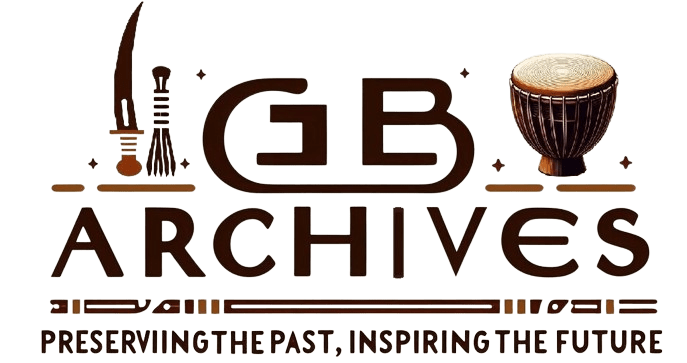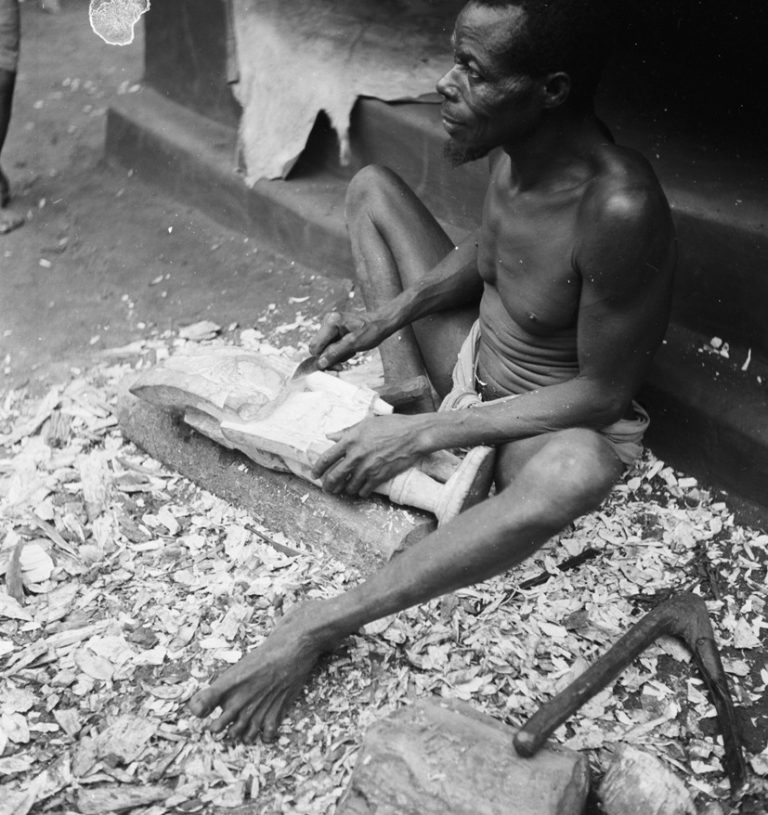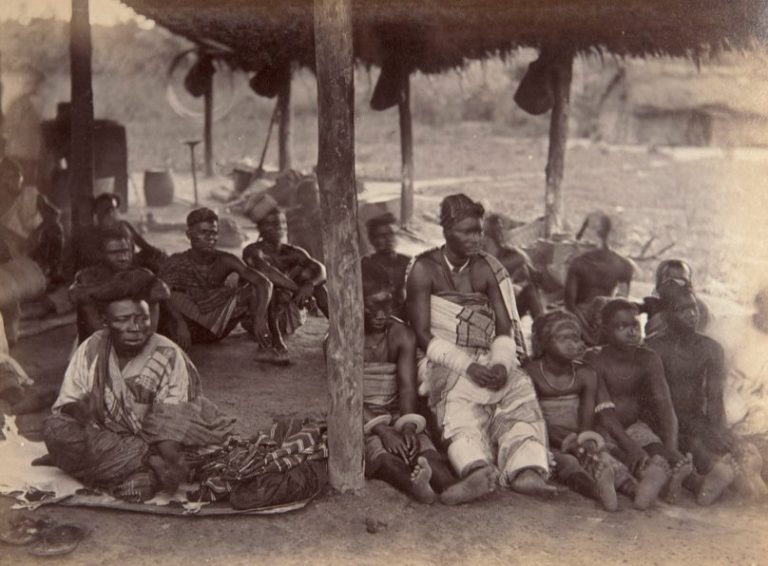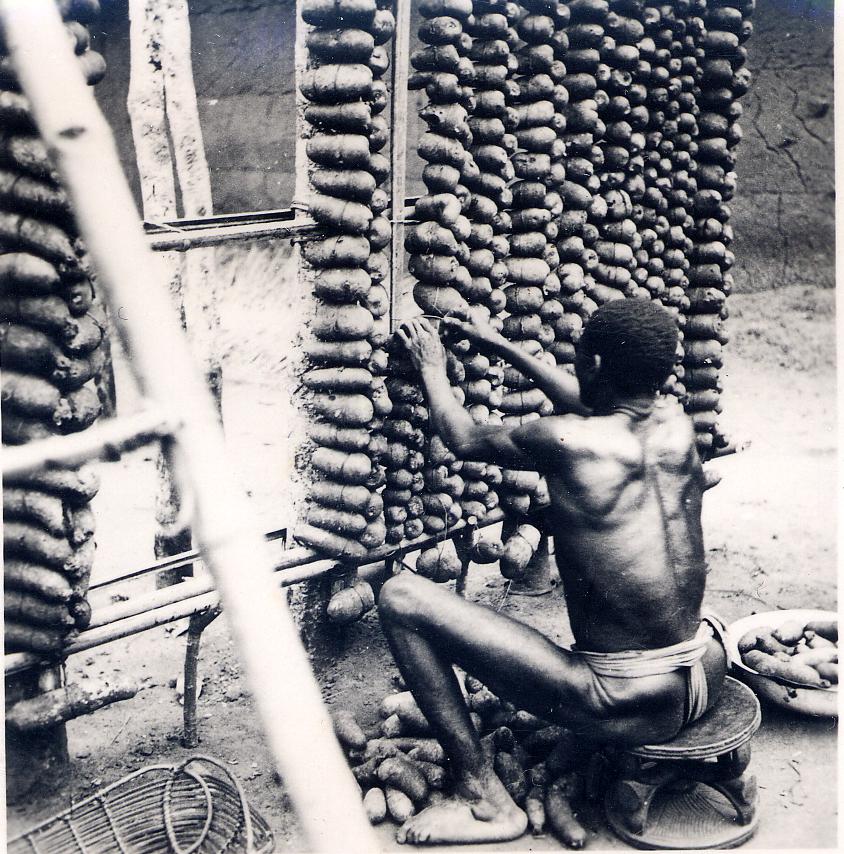
This photograph, taken between 1880 and 1939, depicts an Igbo man tying yams onto a large frame made of poles inside a traditional yam barn. He wears a loin-cloth and sits on a carved stool. The image offers a rare glimpse into the traditional methods of yam preservation in Igboland, Nigeria.
Explore Further
For more on this topic, explore the post below. It provides a deeper insight.
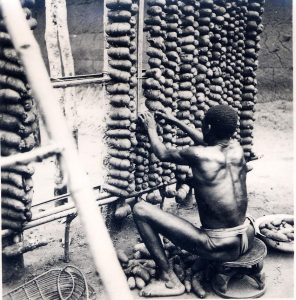 Architectural Insights
Architectural Insights
Yam barns, known as “Oba” in Igbo, serve as more than just storage facilities. They stand as architectural marvels that showcase the ingenuity and cultural heritage of the Igbo people. This post delves into the construction techniques, cultural significance, and preservation efforts of these traditional structures.

Construction of Yam Barns (Oba)
Constructing yam barns involves using locally sourced materials like wooden poles, palm fronds, and ropes. Builders select well-drained areas to prevent waterlogging. They drive wooden poles into the ground to form a rectangular or square foundation. Horizontal beams attach to these poles, creating a sturdy framework that supports the weight of the yams. Palm fronds or thatch create a roof that shields the yams from rain and direct sunlight. The structure allows air to circulate freely, which is crucial for drying and preserving the yams. This communal activity involves family members and neighbors, strengthening social bonds and ensuring the transfer of traditional knowledge across generations.
Cultural Significance of Yam Barns
In Igbo society, yam barns symbolize wealth, status, and hard work. The size of a man’s yam barn often indicates his prosperity and social standing. Larger barns signify greater wealth and the ability to provide for one’s family and community. Yam barns also play a crucial role in cultural practices, such as the New Yam Festival, which marks the beginning and end of the farming season. This festival involves communal activities like dancing, feasting, and offering yams to the gods and ancestors, celebrating the centrality of yams in Igbo culture.
Modernization and Decline
Modern agricultural practices and urbanization have significantly impacted traditional yam barns. The introduction of mechanized farming and modern storage facilities has led to the decline of traditional methods. Additionally, migration to urban areas has resulted in a reduced labor force for yam farming. While modern methods of food preservation are often more efficient, the decline of yam barns represents the erosion of a vital aspect of Igbo agrarian history and communal life.
Preservation Efforts
Efforts to preserve yam barns include cultural festivals like the New Yam Festival, which continues to celebrate yam culture and promote traditional practices. This festival serves as a platform to educate the younger generation about the importance of yam barns in Igbo culture. Initiatives to document and teach traditional yam barn construction methods are crucial for preserving this heritage. Educational programs and community workshops help pass on knowledge to future generations. Integrating traditional methods with modern sustainability goals, such as organic farming and crop rotation, helps maintain soil fertility and promote sustainable yam cultivation.
Conclusion
Yam barns are architectural and cultural treasures that reflect the ingenuity and heritage of the Igbo people. Preserving these structures is crucial for maintaining the cultural fabric of Igboland. As modernization progresses, it is essential to integrate traditional practices to ensure they are not lost to time. By recognizing and valuing the cultural and historical significance of yam barns, we can ensure they remain a vital part of Igbo heritage for future generations.
Have you experienced traditional yam barns? How can we balance modern agricultural practices with the preservation of cultural heritage? Share your thoughts and comments below.
Explore Further
For more on this topic, explore the post below. It provides a deeper insight and a broader perspective.
Discover more from Igbo Archives
Subscribe to get the latest posts sent to your email.

